Does wonkiness interfere with the escapist quality of romance?
Or to put it anot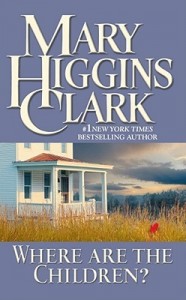 her way, if you write heroes and heroines who are more real, whose conflicts are deeper and wounds more intense, do you risk waking people out of the romance dream?
her way, if you write heroes and heroines who are more real, whose conflicts are deeper and wounds more intense, do you risk waking people out of the romance dream?
We read romance—not exclusively, but often—because it isn’t hyper realistic, like a certain literary novels (*cough* The Corrections), or intensely adrenaline packed, like the opening episode of the first season of Friday Night Lights, which I loved but which had me doing deep breathing afterwards to stave off an acute bout of nausea induced by the injury plot line.
In the abstract, there are certain places I really don’t want my romance to go—children in danger (for a time at least, this sub-genre, a la Mary Higgins Clark, had its own name in publishing, “ped jep”), friends or family members dead, bile-raising injuries sustained.
And yet, one of my critique partners recently gave her hero a dead-child back story, and it worked for me because it made his happily ever after that 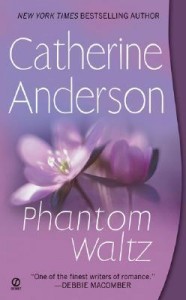 much more intense for me. That man had suffered and being redeemed out of that kind of suffering, being brought to the point where you really believe you deserve to love again—that is what it’s all about.
much more intense for me. That man had suffered and being redeemed out of that kind of suffering, being brought to the point where you really believe you deserve to love again—that is what it’s all about.
Two other wonky books that go where it’s hard to go are Laura Kinsale’s Flowers from the Storm and Megan Hart’s Broken. In Flowers, a historical romance hero’s stroke is mistaken for mental illness and he’s institutionalized. In Broken, the heroine’s husband has been a paraplegic since a skiing accident broke his neck years ago (there are other aspects of Broken that make it wonky—in fact, it’s tricky to find anything non-wonky about Broken, and it’s one of my favorite romances of all time).
Those are some seriously gutsy books, and yet it’s possible to go even further than this—a truly schizophrenic hero or a paraplegic heroine. (For the latter, you can pick up Catherine Anderson’s Phantom Waltz, which I haven’t read.) Also, you have to check out these lists of atypical heroes and heroines on Goodreads.)
Both Flowers and Broken were completely all-consuming experiences for me. I woke from periods of reading both those books like someone who’d been submerged in a dream, not 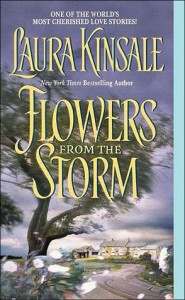 sure where I was or how to re-enter my own existence. I wasn’t heartbroken about the ways that people had suffered or lost in those books, I was uplifted by the ways they’d been redeemed and repaired. And I’d escaped in a much more profound way than I do when I read sugar-light romance, the stuff that feels like it skates over the surface of people and their problems. (Genuinely funny light romance is the exception for me—I go into a zone with that as well, I think because it, like wonky-deep romance, activates emotion at a deep enough level that I abandon my own emotions.)
sure where I was or how to re-enter my own existence. I wasn’t heartbroken about the ways that people had suffered or lost in those books, I was uplifted by the ways they’d been redeemed and repaired. And I’d escaped in a much more profound way than I do when I read sugar-light romance, the stuff that feels like it skates over the surface of people and their problems. (Genuinely funny light romance is the exception for me—I go into a zone with that as well, I think because it, like wonky-deep romance, activates emotion at a deep enough level that I abandon my own emotions.)
That said, there are plenty of ways to write wonk badly, plenty of ways to write dark or weird characters who aren’t realistically wounded or properly repaired. There’s reached-for wonk, where the effort is obvious (I wrote about that a few weeks ago, in “Out in the Swamp, Things Are Murker,”) slathered-on wackiness, or dark gloom that isn’t well-woven into a redemption experience. Just like with any romance, how well a wonky book works as escapism depends entirely on how well it’s handled. If you can disappear into the experience—whether it’s an ordinary or a weird one—you’re gone from the world for the duration. We’ll see you when you get back—dazed, happy, and a little wonkier for the wear.

 It occurred to me this is actually the second time I’ve referenced Grease in a book, and moreover, the second time I’ve referenced Betty Rizzo, specifically. What is it about that character that’s so got her so indelibly tagged across my subconscious? She’s not even the story’s heroine…but could she be?
It occurred to me this is actually the second time I’ve referenced Grease in a book, and moreover, the second time I’ve referenced Betty Rizzo, specifically. What is it about that character that’s so got her so indelibly tagged across my subconscious? She’s not even the story’s heroine…but could she be?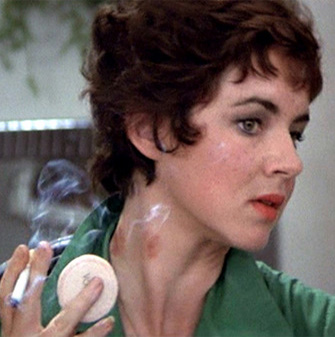
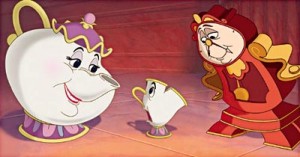 One of my favorite tropes is decidedly unwonky – one might even say a tale as old as time. Romance is full of re-interpretations of the Beauty and the Beast trope… why? Probably most compelling is that the couple must look past the surface, and isn’t that what falling in love is about? Mmm, the animalistic side of man has a certain carnal appeal, I must admit.
One of my favorite tropes is decidedly unwonky – one might even say a tale as old as time. Romance is full of re-interpretations of the Beauty and the Beast trope… why? Probably most compelling is that the couple must look past the surface, and isn’t that what falling in love is about? Mmm, the animalistic side of man has a certain carnal appeal, I must admit.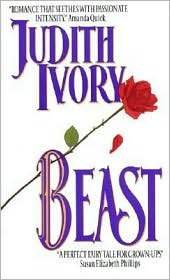
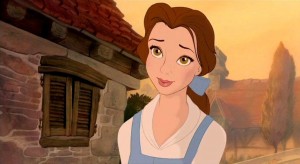 Here? Not quite. The heroine, most people love her on sight. Très belle! But she is…. rather…. sometimes… well, she’s beastly! She is vapid, she recognizes her own vapidity and wishes, in a mostly passive sort of way, to be more. She is vain and selfish and occasionally manipulative, and she recognizes all this, feels mildly mournful, and then goes about her business. And I don’t mean to imply that she was a unsympathetic heroine, because she wasn’t. Despite being shown each unattractive quality in her person, I really liked her. I was rooting for her. (Jolie laide comes to mind.)
Here? Not quite. The heroine, most people love her on sight. Très belle! But she is…. rather…. sometimes… well, she’s beastly! She is vapid, she recognizes her own vapidity and wishes, in a mostly passive sort of way, to be more. She is vain and selfish and occasionally manipulative, and she recognizes all this, feels mildly mournful, and then goes about her business. And I don’t mean to imply that she was a unsympathetic heroine, because she wasn’t. Despite being shown each unattractive quality in her person, I really liked her. I was rooting for her. (Jolie laide comes to mind.)



















